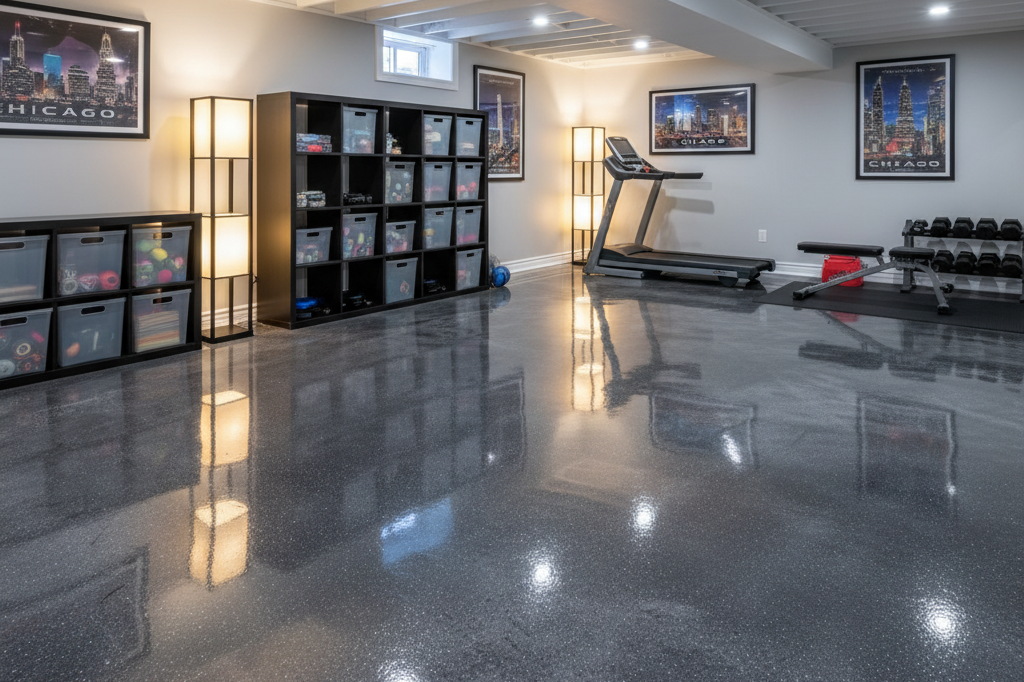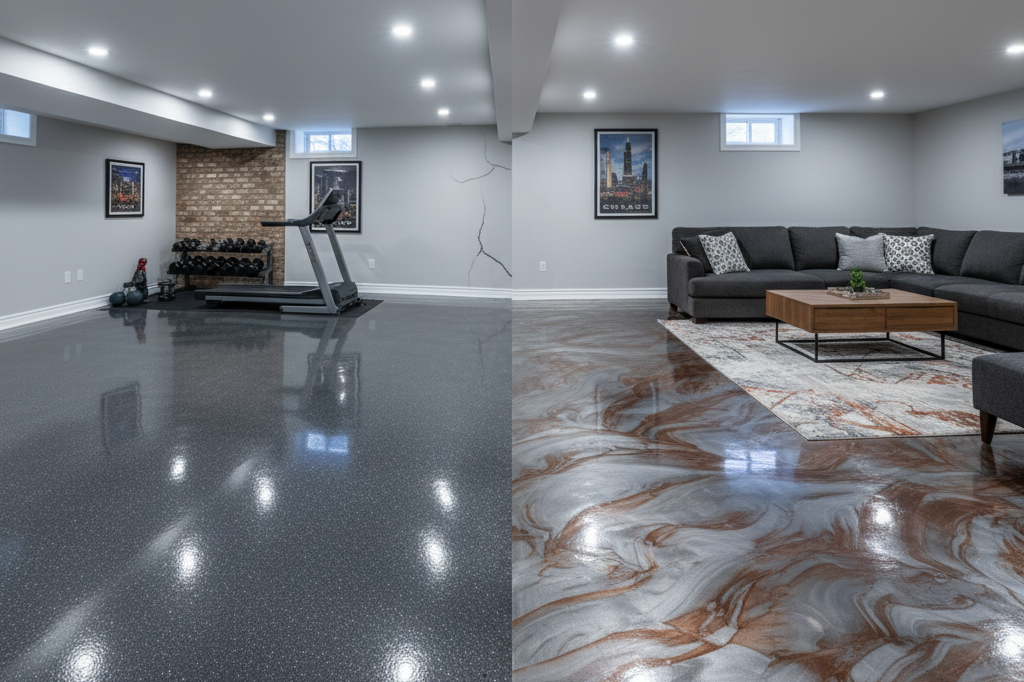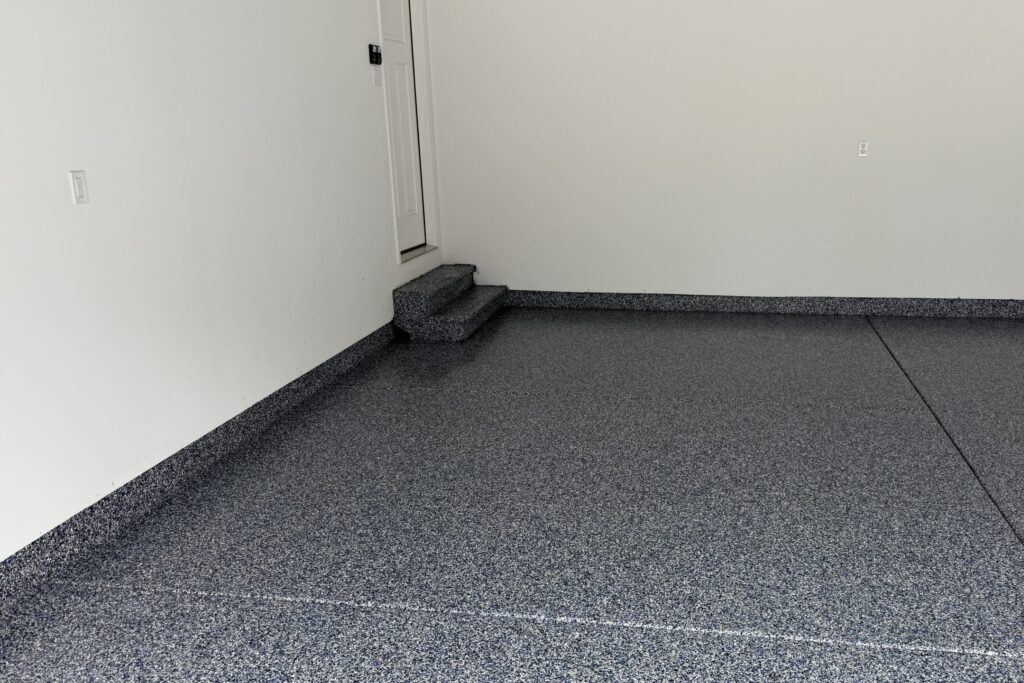Wondering if an epoxy garage floor is worth it? Many homeowners find that an epoxy garage floor is worth it, as it is a great investment due to its durability, visual appeal, and easy maintenance. In this article, we will explore the pros and cons to help you decide if an epoxy garage floor—worth it or not—fits your garage needs.
Key Takeaways
Epoxy garage floors offer durability, aesthetic appeal, and easy maintenance, making them a strong investment for homeowners.
While the application process is crucial for longevity, professional installation typically results in higher quality outcomes compared to DIY methods.
Potential drawbacks include UV sensitivity, slipperiness when wet, and a long curing time, which should be considered when deciding on epoxy flooring.
Is an Epoxy Garage Floor Right for Your Home?

Epoxy garage flooring offers a durable and visually appealing surface that many homeowners find highly satisfactory. Its resistance to stains, chemicals, and abrasions makes it a practical choice for those looking to enhance the functionality and appearance of their garage. Beyond its practical benefits, an epoxy garage floor can also positively impact your home’s value and equity, making it a worthwhile investment.
Epoxy garage flooring offers several benefits:
Durable and visually appealing surface
Resistance to stains, chemicals, and abrasions
Enhances the functionality and appearance of your garage
Can positively impact your home’s value and equity
This makes it a worthwhile investment for homeowners.
However, weighing these advantages against potential costs and long-term results is important. Although epoxy flooring is generally easy to maintain and outlasts many other floor coverings, applying it correctly is crucial. Using quality materials and proper tools is vital, and hiring an experienced team often ensures the best outcome.
Key Benefits of Epoxy Garage Floors

Epoxy garage floors offer numerous advantages that make them an excellent choice for many homeowners. The key benefits include exceptional durability, enhanced aesthetics, and easy maintenance.
These factors collectively contribute to the overall appeal and functionality of epoxy flooring, making it a popular option for residential garage floors.
Durability and Longevity
One of the most significant benefits of an epoxy garage floor is its durability. Epoxy coatings create a strong, thick surface that is more resistant to wear and tear than standard concrete. This makes it particularly suitable for high-traffic areas like garages. When properly installed, epoxy flooring can last between 10 to 20 years, significantly outlasting many DIY applications.
Several factors contribute to the high durability of epoxy floors, including the quality of the materials used and the expertise of the installation team. Professional installations typically provide a longer lifespan and better performance, making the investment in professional services worthwhile for those seeking a long-term solution.
Enhanced Aesthetics
Epoxy floor coatings are available in a wide range of colors and finishes, allowing homeowners to customize their garage floors to match their personal style. Whether you prefer a high-gloss finish or a more subdued matte look, epoxy coatings can be tailored to create the desired aesthetic. The addition of metallic and acrylic flakes can further enhance the visual appeal, creating unique effects and textures. Using garage floor paint can also provide a durable and attractive solution for your space.
The professional finish provided by epoxy coatings significantly enhances the look of a garage, transforming plain concrete floors into attractive, easy-to-clean surfaces. This customization not only improves the overall appearance but also adds value to the home by creating a polished and cohesive look.
Easy Maintenance
Epoxy garage floors are renowned for their ease of maintenance. The seamless nature of epoxy flooring prevents dirt and debris from accumulating, making cleaning a breeze. Unlike other flooring options that require regular reapplication of paint, epoxy floors maintain their appearance with minimal effort.
Epoxy flooring is an excellent solution for high-traffic areas because of its durability and low maintenance requirements. Removing dust and wiping up spills is usually sufficient to maintain the floor’s pristine appearance. This ease of maintenance, combined with its long-lasting performance, makes epoxy flooring an attractive option for garages.
Cost of Epoxy Garage Floor Installation

The cost of installing an epoxy garage floor can vary widely depending on several factors, including the size of the garage, the amount of preparation required, and the type of epoxy used. On average, homeowners can expect to pay around $2,227 for a professional installation. This cost typically includes labor, materials, and any necessary preparation work.
DIY epoxy systems are available for those looking to save on costs, with prices ranging from $600 to $700 for a standard two-car garage. However, it’s important to consider the additional expenses associated with preparation and the potential for higher costs if mistakes are made during the DIY process.
Professionals often ensure quality results and include warranties and ongoing support, making it a worthwhile investment for many homeowners.
Potential Drawbacks of Epoxy Flooring
While epoxy garage floors offer numerous benefits, there are also potential drawbacks to consider. These include sensitivity to UV exposure, slipperiness when wet, and the long curing time required for epoxy coatings.
Understanding these issues and mitigation strategies can help you make a more informed decision about whether epoxy flooring suits your garage.
UV Sensitivity
Epoxy coatings are vulnerable to UV exposure, which can lead to discoloration and degradation over time. Prolonged exposure to sunlight can cause epoxy floors to fade and lose their original color, resulting in an amber tint that compromises the floor’s appearance.
Applying an aliphatic urethane topcoat or a polyurethane/polyaspartic topcoat helps protect the epoxy paint from UV damage and maintains its aesthetic appeal.
Slipperiness When Wet
Another potential drawback of epoxy flooring systems is its smooth finish, which can become slippery when wet, posing a hazard in areas with heavy foot traffic or where moisture issues are common.
Incorporating aggregate into the epoxy mixture creates a non-slip surface, enhancing safety without compromising appearance.
Long Curing Time
The curing process for epoxy coatings is time-consuming and can take several days to complete. This extended curing time can affect project timelines and requires careful planning to avoid disruptions.
Additionally, dust and debris present during the curing process can lead to imperfections in the final finish.
Comparing Epoxy to Other Garage Flooring Options

When considering garage flooring options, it’s essential to compare epoxy with other available choices. Each option has its own set of advantages and disadvantages, including factors such as durability, maintenance, and installation requirements.
Understanding these differences allows you to choose the best flooring solution for your needs.
Polyurea Coatings
Polyurea coatings are known for their superior performance compared to most epoxy systems, offering outstanding UV and abrasion resistance. These coatings cure much faster than epoxy and can be applied in a wider range of temperatures, making them a more versatile option.
For garages in reasonable condition, polyurea coatings may offer lower installation costs and better adhesion and stain resistance, making them an excellent choice.
Garage Floor Tiles
Garage floor tiles offer greater flexibility in design and are easier to install compared to epoxy flooring. These tiles come in various colors and patterns, allowing for significant customization to enhance the look of your residential garage floor.
This versatility makes garage floor tiles a popular alternative for those seeking a quick and cost-effective flooring solution.
Concrete Sealers
Concrete sealers create a barrier that prevents moisture absorption, helping to preserve the integrity of the garage floor and concrete flooring. These sealers are generally easier to apply than epoxy coatings and are available in both clear and tinted options, allowing for some customization of the floor’s appearance.
Although concrete sealers enhance the look of surfaces and provide protection from stains and water damage, they lack the durability and chemical resistance of epoxy coatings. Sealers are often chosen for lighter-duty applications where aesthetic enhancement is the primary goal rather than heavy-duty protection.
DIY vs. Professional Epoxy Application
Deciding between a DIY project and hiring a professional for your epoxy garage floor installation depends on several factors, including your budget, time, and skill level. DIY epoxy projects can be cost-effective, but they require a significant amount of preparation and the right equipment, such as cleaning acids, protective gear, and large tools. The process can be time-consuming and may lead to higher costs if mistakes are made.
On the other hand, hiring a professional ensures a higher quality result, as they have the expertise and equipment to properly prepare the floor and apply the epoxy. Professional installations often come with warranties and ongoing support, providing peace of mind and long-term benefits.
For non-experts, professional installation is usually the recommended option.
How to Properly Prepare Your Garage Floor for Epoxy
Properly preparing your garage floor is crucial for a successful epoxy application. Clear all items from the garage to create an unobstructed workspace. Thoroughly clean the floor to remove dirt, oil, and chemicals, ensuring proper adhesion of the epoxy. Protect walls and surrounding areas from dust during the preparation process.
Conduct a moisture test to check for issues, as excess moisture can lead to cracking and delamination of the epoxy. Level the concrete if it shows signs of sinking or settling before applying the epoxy.
Fill cracks with a suitable epoxy repair product and roughen the surface for optimal adhesion, either by grinding or acid etching. After cleaning and roughening, ensure the concrete is fully dried before applying the epoxy.
Common Issues with Epoxy Garage Floors and Their Solutions

Common issues with epoxy garage floors are:
Hot tire pickup, which occurs when the epoxy coating separates from the concrete due to hot tires. This is more likely with low-quality or improperly prepared floors.
Yellowing, which can happen over time due to exposure to UV light.
Chipping, which may occur if the epoxy is not applied correctly or if it is subjected to heavy impacts.
To mitigate these issues, use high-quality garage floor epoxy specifically designed for garage floors and ensure proper surface preparation.
Moisture during installation can cause bubbling and peeling of the epoxy. Conducting a moisture test and using a moisture barrier can prevent these issues. Regular maintenance, such as promptly cleaning up spills and avoiding harsh chemicals, can prevent scratches and stains, ensuring the longevity of your epoxy garage floor.
Personalizing Your Epoxy Garage Floor
Personalizing your epoxy garage floor allows you to create a space that reflects your style and meets your functional needs. You can choose from a wide range of colors and finishes, from high-gloss to matte, to customize the look of your garage. Adding decorative flakes can enhance the visual appeal and help hide imperfections in the surface.
For a truly unique touch, consider incorporating logos or custom designs into your epoxy floor. Different textures can also be applied to improve slip resistance and add depth to the flooring surface. These personalization options make epoxy garage floors a versatile choice for homeowners looking to create a distinctive and functional space.
Summary
In summary, epoxy garage floors offer a range of benefits, including exceptional durability, enhanced aesthetics, and easy maintenance. These floors can significantly improve the functionality and appearance of your garage while potentially increasing your home’s value. However, it’s important to consider the potential drawbacks, such as UV sensitivity, slipperiness when wet, and long curing times. Comparing epoxy with other flooring options, such as polyurea coatings, garage floor tiles, and concrete sealers, can help you make an informed decision. Whether you choose to tackle the project yourself or hire a professional, proper preparation and understanding of common issues will ensure a successful epoxy garage floor installation. Ultimately, with the right approach, an epoxy garage floor can be a valuable addition to your home, offering both practicality and visual appeal.
Frequently Asked Questions
How long does an epoxy garage floor last?
A professionally installed epoxy garage floor can last between 10 to 20 years, offering durability that outlasts many DIY alternatives.
Can I install an epoxy garage floor myself?
Yes, you can install an epoxy garage floor yourself, but it demands significant preparation and the right tools for a successful application. For optimal results, consider hiring a professional.
What are the common issues with epoxy garage floors?
Epoxy garage floors often face issues such as hot tire pickup, yellowing, chipping, and moisture problems. Ensuring proper preparation and using high-quality materials can effectively reduce these concerns.
How much does it cost to install an epoxy garage floor?
Installing an epoxy garage floor typically costs around $2,227 for professional installation, while DIY kits can range from $600 to $700, depending on factors such as garage size and preparation required.
How can I personalize my epoxy garage floor?
Personalizing your epoxy garage floor is easily achieved by selecting from a range of colors, finishes, and decorative flakes, or by incorporating custom designs and logos for a unique touch. This allows you to create a floor that truly reflects your style.



